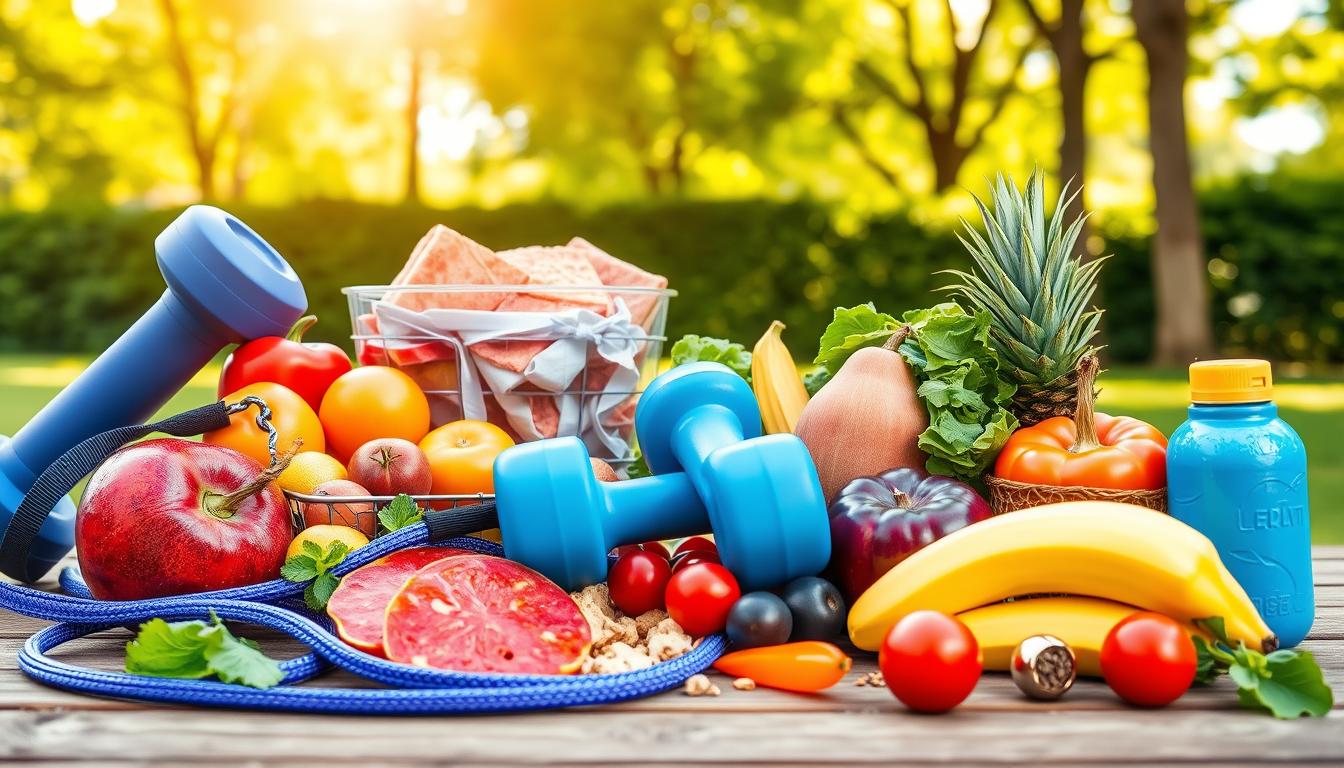Are you tired of struggling with stubborn weight that refuses to budge? Losing weight quickly and safely is indeed possible. This article will unveil proven strategies backed by scientific research to help you achieve your goals. We’ll explore a comprehensive approach to shed those extra pounds and transform your health for the better.
Key Takeaways
- Embrace intermittent fasting techniques like Alternate Day Fasting, the 5:2 Diet, and the 16/8 Method for effective weight loss.
- Consistently track your diet and exercise to stay accountable and make informed decisions.
- Practice mindful eating by avoiding distractions, chewing thoroughly, and savoring every bite.
- Increase your protein intake to stay full and preserve muscle mass during weight loss.
- Ditch refined carbs and added sugars in favor of nutrient-dense, high-fiber foods.
Intermittent Fasting: A Powerful Tool for Weight Loss
Intermittent fasting is a top choice for losing weight. It means fasting for short periods and eating within a shorter window. Studies show it’s as good as eating fewer calories every day.
Alternate Day Fasting (ADF)
Alternate day fasting (ADF) is a favorite. You fast for 24 hours, then eat for 24 hours. A 2016 study found ADF works as well as eating less every day.
The 5:2 Diet
The 5:2 diet is well-known too. You eat normally for 5 days and eat 500-600 calories for 2 days. A 2018 study showed it’s as good as eating less every day for losing weight and controlling blood sugar in people with type 2 diabetes.
The 16/8 Method
The 16/8 method is also popular. You fast for 16 hours and eat in an 8-hour window. A 2023 review found it and eating less are both good for weight control. Starting your eating window before noon helps more with weight loss.
Intermittent fasting helps you lose weight by burning fat. By trying different methods, you can find what works best for you. This way, you can reach your weight goals.
“Intermittent fasting is one of the world’s most popular health and fitness trends, and for good reason. It can lead to significant weight loss, improve various health markers, and may even extend lifespan.”
Tracking Your Diet and Exercise for Accountability
Keeping a food journal or using a food tracking app can help a lot. Even a simple pedometer can be useful. Tracking what you eat and how much you move can change your habits. It boosts motivation and gives you insights into your lifestyle.
Research shows that tracking food and exercise helps people lose more weight. The BetterTogether Weight Loss App has helped over 200,000 people. It lets you set goals, track fitness, and connect with others for support.
The BetterTogether app has tools for tracking weight, fitness, and calories. It’s designed for everyone, no matter your fitness level. You can see your progress and get tips to keep you going.
| Key Features | Benefits |
|---|---|
| Weight tracking | Helps users monitor their progress and adjust strategies as needed |
| Fitness tracking | Encourages users to stay active and meet their fitness goals |
| Calorie counting | Enables users to create a calorie deficit for weight loss |
| Supportive community | Enhances accountability and provides a sense of shared journey |
Consistency and accountability are key to losing weight. By tracking your food and exercise, you can learn a lot. It keeps you motivated and helps you reach your goals.
Mindful Eating: Savor Every Bite and Avoid Overeating
Mindful eating changes how you see food and helps with weight loss. It makes meals more enjoyable and helps you eat just the right amount. This way, you develop better eating habits.
Sit Down and Focus on Your Food
Being fully present at meals is key to mindful eating. Don’t eat in front of the or while on your phone. Instead, take time to enjoy your food. This way, you notice the tastes, smells, and textures better.
Avoid Distractions While Eating
Eating while doing other things can make you eat too much. Don’t work, read, or check your phone while eating. Make your eating area calm and free from distractions. This lets you fully enjoy your meal.
Eat Slowly and Chew Thoroughly
Eating slowly is important in mindful eating. Chew each bite well and enjoy the flavors. This makes your meal more enjoyable and helps you feel full sooner.
“Mindful eating is as effective for weight loss as conventional diet programs.”
Studies show mindful eating is great for managing weight. It helps you listen to your body’s hunger and fullness signals. This leads to healthier eating habits and better overall well-being.
Protein Power: Stay Full and Preserve Muscle Mass
Protein is key for losing weight. It helps you feel full and keeps your muscles strong. This is important when you’re eating fewer calories.
Research shows that eating more protein can make you feel less hungry. It also makes you feel fuller longer. This can help you eat fewer calories and lose weight.
Keeping your muscles strong is also vital. A diet rich in protein helps you do this. It keeps your metabolism healthy, which is great for losing weight without hitting a plateau.
| Protein Intake Benefits | Research Findings |
|---|---|
| Appetite regulation | A 2015 study showed a high-protein breakfast helped older women consume 135 fewer calories later in the day compared to a low-protein breakfast. |
| Increased satiety | A 2016 meta-analysis linked high protein intake with increased feelings of fullness and reduced hunger. |
| Muscle preservation | A 13-week study in older adults with obesity found that those who consumed an extra 20 grams of protein weekly through shakes gained 2.8 pounds more muscle mass. |
| Fat loss | A 14-week study showed women on a high-protein diet lost 1.7 times more body fat than those on a high-carb diet. |
To get the most from a high-protein diet, aim for 25-30 grams of protein at each meal. You can get this from lean meats, eggs, dairy, legumes, and protein shakes. Adding protein-rich foods to your diet can help you stay full, keep your muscles strong, and support your weight loss goals.
Protein shakes may help lower body fat, keep lean muscle, feel full, and aid in weight loss.
Ditch Refined Carbs and Added Sugars for Weight Loss
Trying to lose weight? Cutting back on refined carbs and added sugars is key. These carbs are in many processed foods and can hinder your weight loss.
Refined carbs like white bread and pasta are quickly digested. This can cause blood sugar spikes and insulin release. On the other hand, whole grains like brown rice and quinoa are digested slower. They provide steady energy and help you feel full longer.
Added sugars in snacks and some “healthy” foods can also lead to weight gain. These empty calories offer little nutritional value and can cause overeating. Switching to whole grains, fruits, and veggies can help you eat fewer calories and support weight loss.
“Eating less refined carbs and added sugars may be one of the most effective dietary changes for losing weight and improving overall health.”
The Dietary Guidelines for Americans suggest carbs should be 45% to 65% of daily calories. The FDA recommends 275 grams of carbs for a 2,000-calorie diet. Studies show low-carb diets can lead to better weight loss than low-fat diets for up to a year.
To aid in your weight loss, focus on whole grains, fruits, and veggies. Limit refined carbs and added sugars. This simple change can greatly impact your weight loss journey.
Fiber Up: The Secret to Feeling Fuller for Longer
Dietary fiber is a key player in sustainable weight loss. It’s a type of carb that our bodies can’t digest. It’s vital for gut health and helps you feel full longer, which can cut down on calorie intake.
Fiber-Rich Food Sources
To boost your fiber intake, focus on whole foods. Here are some top sources:
- Whole grains, such as oats, quinoa, and brown rice
- Fruits, including berries, pears, and apples
- Vegetables, like broccoli, Brussels sprouts, and artichokes
- Nuts and seeds, such as chia seeds, flaxseeds, and almonds
- Legumes, including beans, lentils, and chickpeas
Women should aim for 25 grams of fiber daily, while men should aim for 38 grams. But, increase your fiber slowly to avoid stomach issues. Drink plenty of water with your fiber-rich foods for better digestion.
Viscous, soluble fibers in foods like beans, oats, and flaxseeds aid in weight loss. They slow down stomach emptying, making you feel full longer.
Eating a variety of high-fiber foods can help with weight loss. By choosing high-fiber foods, you support your satiety and health goals.
Gut Health and Weight Management
Research shows that the balance of bacteria in our gut, or the gut microbiome, is key to managing weight. Some gut bacteria affect how we get energy from food, which can lead to weight gain or loss. A healthy gut microbiome can help with weight loss.
Probiotic-Rich Foods
Eating foods rich in probiotics, like yogurt, kefir, sauerkraut, and kimchi, is good for our gut. These foods have live, helpful bacteria. They help improve gut health and might help with weight loss.
Prebiotic Foods
It’s also important to eat prebiotic foods to keep our gut healthy. Foods like bananas, onions, garlic, and whole grains feed the good bacteria in our gut. This helps them grow and thrive.
| Probiotic-Rich Foods | Prebiotic Foods |
|---|---|
| Yogurt, Kefir, Sauerkraut, Kimchi | Bananas, Onions, Garlic, Whole Grains |
Eating both probiotic-rich and prebiotic-rich foods can help keep our gut healthy. This can lead to better gut health and weight loss.
“Gut health is the key to unlocking sustainable weight loss. By nourishing the good bacteria in our gut, we can support our body’s natural ability to manage weight effectively.”
lose weight fast lose weight fast: The Importance of Sleep
Getting quality sleep is key for losing weight. Many studies show that bad sleep can hurt your metabolism and hormone balance. This makes it hard to manage your weight.
Lack of sleep slows down your metabolism. A study found that sleep cutbacks of 14 days reduced fat loss by 55%. Also, insulin sensitivity drops by over 30% in just 4 days. This makes it tough for your body to handle fats, leading to weight gain.
- About 35% of US adults are sleeping fewer than 7 hours most nights (1).
- Short sleep duration has been linked to a 41% increased obesity risk among adults (2).
- Short sleep duration was found significantly associated with greater waist circumference (3).
Bad sleep messes with hormones like leptin and ghrelin. This can make you hungrier and crave more food. In fact, sleep-deprived people tend to eat snacks with twice as much fat. They also eat more high-calorie foods.
“Lack of sleep can lead to an increase in daily calorie intake, estimated at an additional 385 calories per day (18).”
To help with weight loss, aim for 7-9 hours of sleep each night. Good sleep habits can boost your metabolism and control hunger. This makes it easier to keep a healthy weight.

Conclusion
Reaching sustainable weight loss needs a full plan that covers diet and lifestyle. Using methods like intermittent fasting and tracking your habits can help. Also, eating mindfully, boosting protein and fiber, and focusing on sleep and stress are key.
Intermittent fasting can lead to weight loss, with studies showing 7-11 pounds in 10 weeks. Yet, its long-term benefits compared to regular calorie cutting are still debated. People with health issues should talk to doctors before trying it.
The secret to lasting sustainable weight loss is making lasting lifestyle changes. A healthy lifestyle that includes proven methods can help you reach your goals. It also helps you have a better relationship with food and your body.


